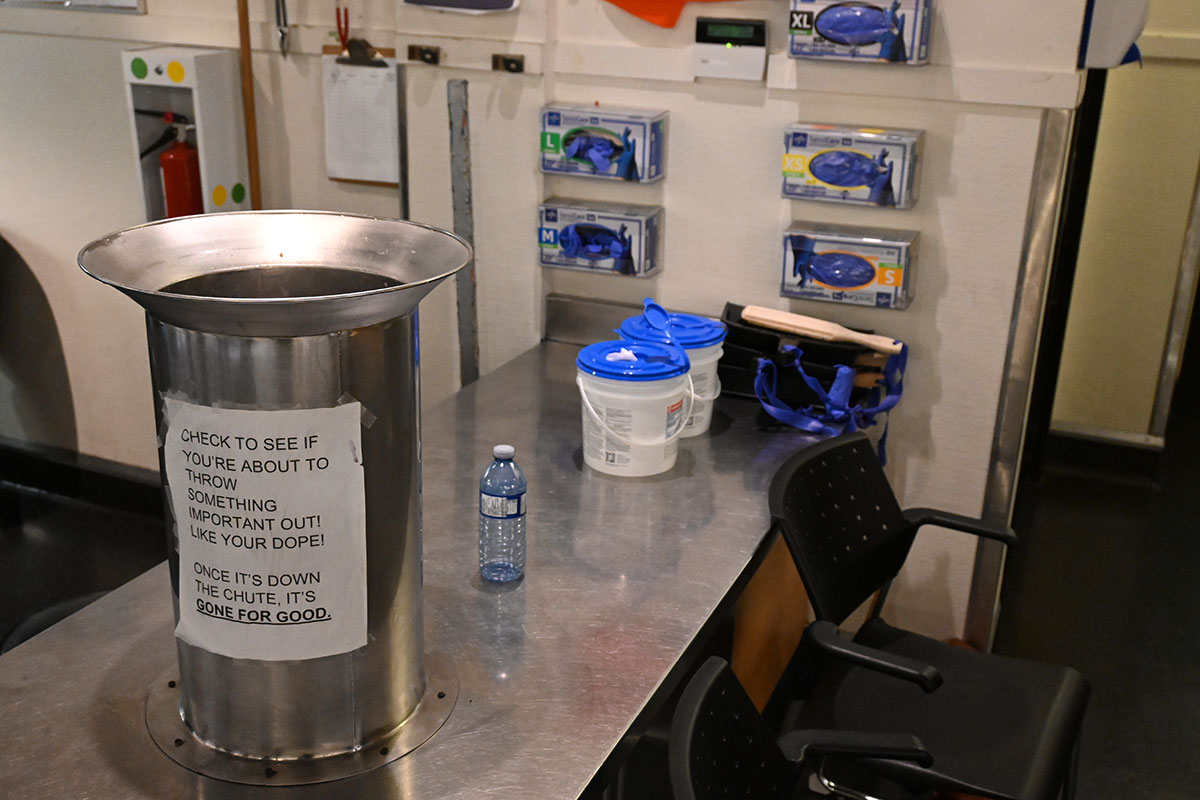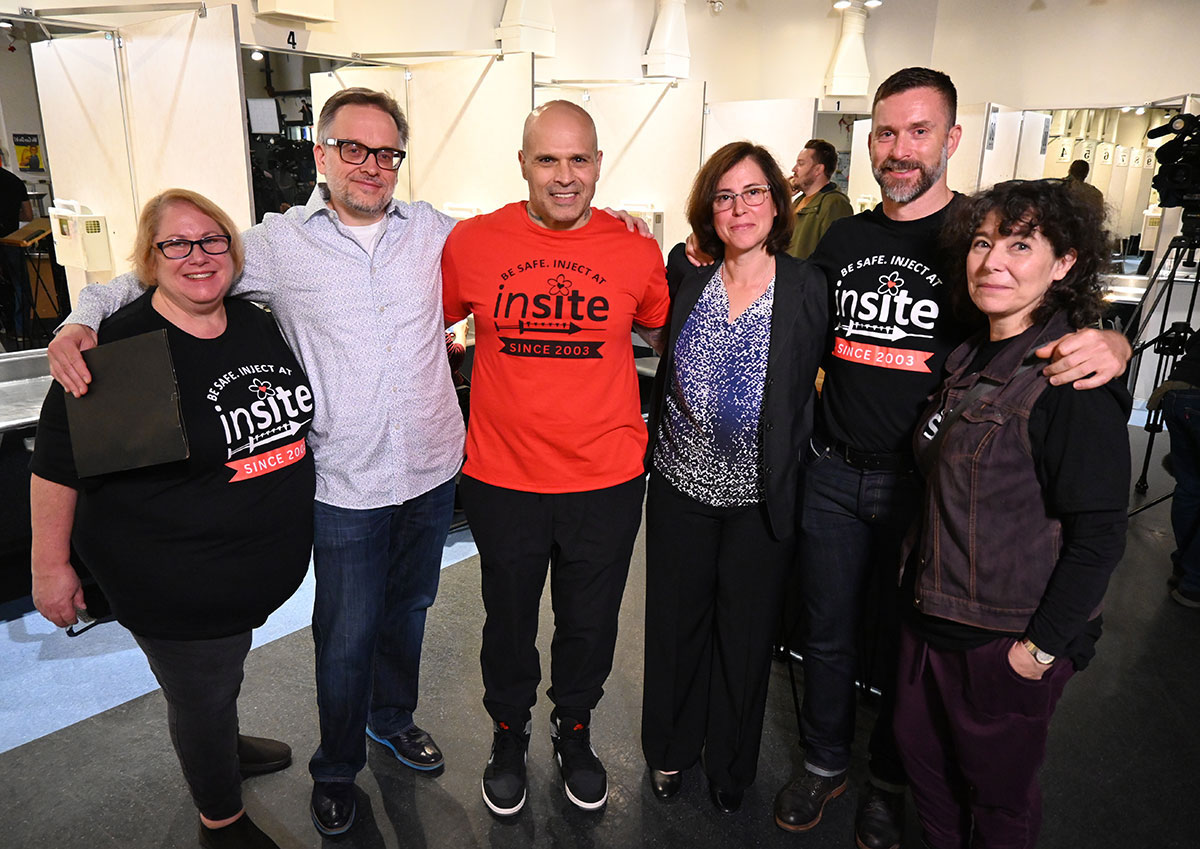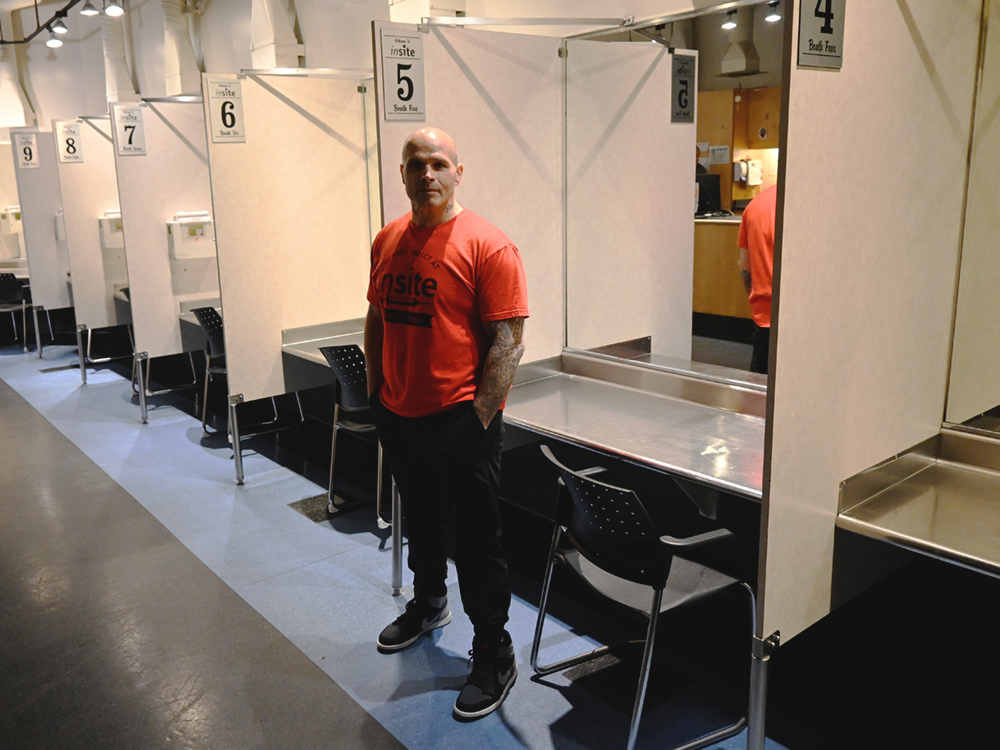Over the last two decades, Insite, located in Vancouver's Downtown Eastside, has had people walk through its doors 4.6 million times, and welcomed people into its supervised injection room three million times, said Dr. Mark Lysyshyn, deputy chief medical health officer of Vancouver Coastal Health.
Insite held an early morning media scrum on Thursday to talk about the supervised consumption site’s impact on the community. Later in the day the community hosted a street party in the DTES in the early afternoon to celebrate.
Insite has reversed 11,856 overdoses and referred 71,103 patients to treatment programs, like Onsite, located upstairs to the overdose prevention site, or other programs around the Lower Mainland, Lysyshyn said.
The site opened its doors on Sept. 21, 2003, in an effort to reduce the spread of blood-borne pathogens like HIV and hepatitis C, said Susan Alexman, director of programs at PHS. “Unfortunately we’ve now moved into a toxic fentanyl crisis and we’re working really hard to ensure people are not dying from this crisis as well.”
The illicit drug supply in British Columbia has been getting increasingly potent over the past decade with opioids like heroin being replaced by stronger opioids like fentanyl, and recently with fentanyl analogues and other synthetic opioids like nitazenes.
Drugs purchased through the illicit market also increasingly contain other substances like benzodiazepines, which can complicate an overdose. When people buy illicit drugs they do not have a guarantee of the drug’s potency, purity or what is in the substance, so even an experienced drug user can accidentally overdose.
Harm reduction initiatives like naloxone kits can temporarily reverse an opioid overdose but the illicit drug supply continues to increase in toxicity which is making harm reduction initiatives like naloxone less effective.

That’s why Michael Vonn, CEO of PHS Community Services Society said the “end goal” of harm reduction is safer supply, whether prescribed by a clinician or accessed another way.
Insite has a history of leading the harm reduction charge, both on the ground and in the courts, said Monique Pongracic-Speier, a lawyer with Ethos Law Group.
Insite initially opened thanks to a collaboration with people in the community, the PHS, Vancouver Coastal Health, the City of Vancouver, the Vancouver Police Department and provincial and federal governments, she said. Legally, it was allowed to exist because of a federal exemption from the Controlled Drugs and Substances Act, which meant people could come with their drugs and staff could work without fear of arrest.
In 2008, under a federal government run by then-prime minister Stephen Harper, Insite was told the exemption would not be renewed, which put “Insite’s very existence into jeopardy,” Pongracic-Speier said.
This launched two lawsuits challenging the Controlled Drugs and Substances Act, which both argued the law overstepped provincial rights to oversee health care — arguing Insite was health care in action — and a person’s right to life, liberty and security of the person.
Mark Underhill, a lawyer with Arvay Finlay, took a moment to acknowledge the work done by lawyer Joe Arvay in the legal battle. Underhill gave a shoutout to a Tyee article, “Joe Arvay Changed Your Life,” for its summary of Arvay’s accomplishments. Arvay passed away three years ago.
The cases won, but were appealed all the way to the Supreme Court of Canada.
Pongracic-Speier said she was standing in Insite’s supervised injection room at 6:30 a.m. on Sept. 30, 2011, when the Supreme Court released its decision that ending Insite’s exemption would be unconstitutional. The court went on to order the federal minister of health to grant the exemption.
This decision was important for many reasons, she said.
First, it allowed Insite to keep its doors open then and celebrate its 20th anniversary today.
“We know that saved lives by preventing fatal overdoses and deaths from drug poisonings and by reducing disease transmission and infection from needle sharing and high-risk injection practices,” Pongracic-Speier said.
But the legal battle also helped shift the public discussion about drugs from crime to health care and helped demystify and explain harm reduction, she said.
This has helped push for further harm reduction services.

During the legal battle Insite was the only lawfully operating supervised consumption site in Canada. Today there are 40 overdose prevention sites in B.C. — with four of them having legal exemptions, Lysyshyn said.
Guy Felicella, a peer clinical advisor with the BC Centre on Substance Use, shared his personal story about his history of drug use and recovery.
Felicella travels to schools to talk to kids about substance use and is often featured in the news as a go-to expert to weigh in on news stories about drugs and harm reduction.
On Thursday he spoke about the 4,000 times he used Insite during his decade of using drugs. He told The Tyee how staff would let him hang out late and only send him out the door when they closed up shop and headed home at 3 a.m.
Felicella said he overdosed six times during a nine-month period, with the final overdose happening at Insite on Feb. 18, 2013. When staff revived him, Felicella said he was moved by how the nurse who brought him back was crying.
“I don’t remember going down but I remember waking up and seeing the nurse visibly emotional, telling me ‘I care about you, Guy.’ I burst into tears. There were many moments that led to that moment where I told her, ‘I don’t want to do this anymore.’”
He had been down for seven minutes, meaning he came close to being Insite’s first fatality, he said.
To this day no one has overdosed and died at Insite.
Felicella said he hadn’t wanted to go to the hospital so staff let him hang out at Insite. From there he moved to Onsite, the upstairs treatment centre, before being moved to a treatment centre in Surrey.
“The life I have today would not exist if this facility didn’t exist,” he said. “I can’t stress how vital and important this is not only to myself but so many people who are on similar paths and journeys. This facility not only saves lives but it builds a connection with a community. That connection empowers people to change their own circumstances.”
As Felicella often says, you can’t help someone if they’re dead.
Insite has the largest database on overdoses in the world because people come in and tell staff what drug they’re planning on using, Lysyshyn said.
When someone overdoses on fentanyl their chest goes rigid and their arms can flail around, he said. Staff at Insite were documenting this when fentanyl first appeared in B.C., which helped gain the attention of anesthesiologists, who work with fentanyl and were aware of the overdose signs, he added.
When fentanyl stared showing up in B.C. the risk of overdose for all drugs increased 10 times because it could be mixed into any substance, Lysyshyn said.
Alexman, director of programs at PHS, said Insite has always opened its doors to everyone and welcomed people into a dry, warm, safe space and offered harm reduction supplies like clean needles, condoms and pipes. People can give their name or use a pseudonym.
Staff are friendly and willing to listen, she added. During these visits people can chat with staff and volunteers, which creates opportunities to connect people with services, like health care if they’re complaining about an infected leg, or housing if they say they don’t have anywhere to sleep.
Felicella said these “non judgemental supports” made him always feel welcomed and loved.
“Most importantly, I've always felt that they care,” Felicella said.
Harm reduction, safer supply and supervised injection services are under political scrutiny right now, with Conservative party Leader Pierre Poilievre saying he wants to focus on treatment above all else and cut funding for harm reduction services.
But the Insite team said they’ve weathered Conservative scrutiny in the past.
“We let the evidence speak for itself,” PHS’s Vonn said.
Insite, Vonn said, is “trying to keep the politics out of what we do. Because simply the facts tell the story. We don't need to have a gloss of partisanship on something that is so fundamentally a human rights and health-care issue.”
* Story updated on Monday, Sept. 18 at 7:14 a.m. to correct the number of visits Insite has had, the number of overdoses it has reversed, and the number of people it has referred for treatment. ![]()
Read more: Health, Rights + Justice
















Tyee Commenting Guidelines
Comments that violate guidelines risk being deleted, and violations may result in a temporary or permanent user ban. Maintain the spirit of good conversation to stay in the discussion and be patient with moderators. Comments are reviewed regularly but not in real time.
Do:
Do not: